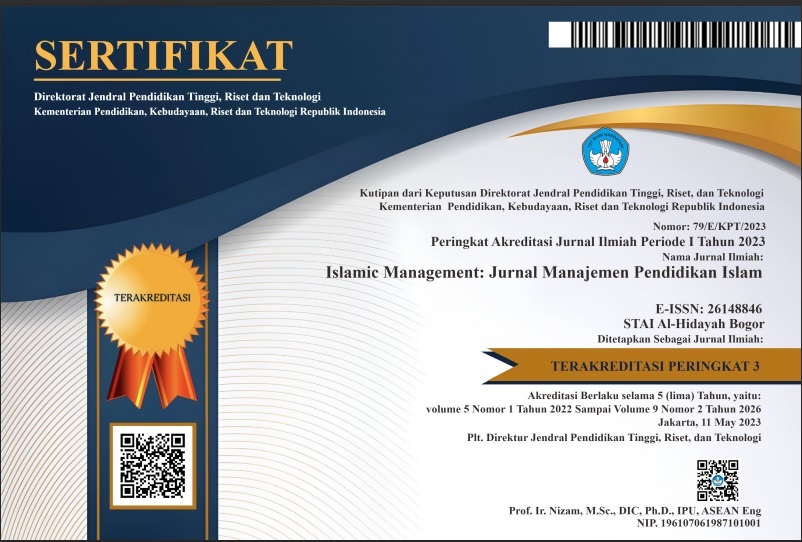CONTRIBUTION OF MUALLIM AL KHUDRI BIN KHATIB SHAHIH IN ISLAMIC EDUCATION IN SUBULUSSALAM CITY
DOI:
https://doi.org/10.30868/im.v8i01.8129Keywords:
Contribution, Islamic EducationAbstract
This research aims to describe the biography of Muallim Al Khudri bin Khatib Shahih, analyze his role in the development of Islamic education in the City of Subulussalam, and analyze the implications of his contributions to Islamic education in the City of Subulussalam. The research method used is a qualitative method with a figure study approach, which is implemented through data collection techniques such as interviews, observation, and analysis of the figure's life journey records. The results showed that Muallim Al Khudri, with an educational background in traditional Islamic boarding schools (dayah) and higher education, has a high dedication to advancing Islamic education in the City of Subulussalam. His role is reflected in the establishment of the Raudhatul Jannah Integrated Islamic Boarding School (ErJe) which implements an integrated Tarbiyatul Muallimin Al Islamiyah (TMI) curriculum, combining religious knowledge, general knowledge, and foreign language skills. He is also active in teaching at Islamic elementary schools (TPA), conducting religious studies, and preaching. The implications of his contributions include increasing the accessibility and quality of Islamic education, strengthening the character and morals of the community, and increasing religious awareness. This research provides a comprehensive picture of the contribution of Muallim Al Khudri in building Islamic education in the City of Subulussalam, as well as its implications for society.
References
Ahmad, Zainal. (2018). "Kontribusi Tokoh Lokal dalam Pendidikan Islam di Indonesia". Jurnal Pendidikan Islam, 45(2), 122-145.
Amrullah, Abdul Malik Karim & Djumransjah. (2007). Pendidikan Islam Menggali Tradisi Mengukuhkan Eksistensi. Malang: UIN Malang Press.
Al-Rasyidin. (2012). Falsafah Pendidikan Islami; Membangun Kerangka Ontologi, Epistemologi dan Aksiologi Praktik Pendidikan. Bandung: Citapustaka Media.
Arifin, Muzayyin. (2010). Filsafat Pendidikan Islam. Jakarta: PT Bumi Aksara.
Dalimunthe, M. A., Pallathadka, H., Muda, I., Devi Manoharmayum, D., Habib Shah, A., Alekseevna Prodanova, N., Elmirzayevich Mamarajabov, M., & Singer, N. (2023). Challenges of Islamic education in the new era of information and communication technologies. HTS Teologiese Studies / Theological Studies, 79(1). https://doi.org/10.4102/hts.v79i1.8608
Dalimunthe, M.A. (2022). Keterampilan Komunikasi Antarbudaya Mahasiswa Malaysia di Kota Medan. Langgas: Jurnal Studi Pembangunan 1 (2), 82-89
Dalimunthe, M. A., Syam, A. M., Suhendar, A., & Al-Mujtahid, N. M. (2024). Deconstructing Islamic Cyberculture: Mitigating Inferiority and Cancel Culture in Virtual Space. OPINI: Journal of Communication and Social Science, 1(2), 12-26.
Fatimah, Khadijah. (2017). "Peranan Ulama dalam Pembangunan Pendidikan di Aceh". Jurnal Ulama dan Pendidikan, 38(4), 276-300.
Hanafi, Burhanuddin. (2021). "Dinamika Pendidikan Islam di Era Modernisasi". Seminar Nasional Pendidikan Islam, 55(2), 190-215.
Harahap, Syahrin. (2014) Metodologi Studi Tokoh dan Biografi dan Penulisan Biografi, (Jakarta: Prenadamedia Group)
Hidayat, Rahmat. (2016). Ilmu Pendidikan Islam (Menurut Arah Pendidikan Islam Indonesia). Medan: LPPPPI.
Humaizi, Hasan NNN, Dalimunthe MA, Ramadhani E. (2024). Harmony in virtual space: Forum Kerukunan Umat Beragama (FKUB) development communication in creating digital literacy based on religious moderation. Journal of Infrastructure, Policy and Development. 8(7): 4299. https://doi.org/10.24294/jipd.v8i7.4299
Indainanto, Y. I., Dalimunthe, M. A., Sazali, H., Rubino, & Kholil, S. (2023). Islamic Communication in Voicing Religious Moderation as an Effort to Prevent Conflicts of Differences in Beliefs. Pharos Journal of Theology, 104(4). https://doi.org/10.46222/pharosjot.104.415
Irwan., Desnelita, Y., Susanti, W., Rizal, F., & Ritonga, A. R. (2023). The Implementation of Collaborative Project Based Learning Model with Inquiry Process using E-Learning in Higher Education. Educational Administration Theory and Practice, 29(1), 90–101. Available at: 10.48047/rigeo.11.09.187
Kausar, M. (2020). Metode Pembelajaran Kitab Kuning Di Dayah Ma ‘Had Al-‘Ulūm Dīniyyah Al-Islāmiyyah Mesjid Raya Mudi Mesra Samalanga, Aceh, Indonesia. Ar-Raniry: International Journal of Islamic Studies, 7(1), 24-35.
Khudri, Abdul. (2021). Pendidikan Islam di Era Digital: Tantangan dan Peluang. Penerbit Suka Cita.
Mailin, M., Dalimunthe, M.A. & Zein, A. (2023). Exploring Intercultural Communication in Indonesia: Cultural Values, Challenges, and Strategies. Journal of Namibian Studies: History Politics Culture 33, 2804-2816.
Marzuki, M. (2011). Sejarah Dan Perubahan Pesantren Di Aceh. Millah, 221-233.
Mujib, Abdul. (2010). Ilmu Pendidikan Islam. Jakarta: Kencana.
Nur, Muhammad. (2020). "Sistem Pendidikan Dayah di Aceh dan Perannya dalam Pembentukan Karakter Umat". Perspektif Islam Kontemporer, 34(1), 98-115.
Sikumbang, A. T., Dalimunthe, M. A., Kholil, S., & Nasution, N. F. (2024). Digital Da'wah Indonesia Ulema in the Discourse of Theology. Pharos Journal of Theology. 105(1). 1-14. https://doi.org/10.46222/pharosjot.1051
Smith, John. (2015). Educational Contributions: An Overview. Journal of Education.
Syam, A. M., Dalimunthe, M. A., Suhendar, A., & Rambe, R. F. A. K. (2024). Islamic Philosophy: A Comparative Perspective Between Ibnu Khaldun And Karl Marx. SYAHADAT: Journal of Islamic Studies, 1(2), 55-72.
Tafsir, Ahmad. (2000). Metodologi Pengajaran Agama Islam. Bandung: PT. Remaja Rosdakarya.
Taylor, Laura. (2020). Emotional and Spiritual Contributions in Education. Spiritual Education Journal.
Yusuf, Jamil. (2019). "Adaptasi Kurikulum Tradisional dalam Pendidikan Islam di Indonesia". Majalah Ilmiah Islam Nusantara, 29(3), 211-230.
Zulkifli. (2001). "Sejarah Pendidikan Islam di Aceh". Jurnal Pendidikan Islam, 55-70.
Downloads
Published
How to Cite
Issue
Section
Citation Check
License
Copyright (c) 2025 Subhani Subhani, Azizah Hanum OK, Mohammad Al Farabi

This work is licensed under a Creative Commons Attribution-ShareAlike 4.0 International License.
Authors who publish with this journal agree to the following terms:
- Authors retain copyright and grant the journal right of first publication with the work simultaneously licensed under a Creative Commons Attribution License that allows others to share the work with an acknowledgment of the work's authorship and initial publication in this journal.
- Authors are able to enter into separate, additional contractual arrangements for the non-exclusive distribution of the journal's published version of the work (e.g., post it to an institutional repository or publish it in a book), with an acknowledgment of its initial publication in this journal.
- Authors are permitted and encouraged to post their work online (e.g., in institutional repositories or on their website) prior to and during the submission process, as it can lead to productive exchanges, as well as earlier and greater citation of published work (See The Effect of Open Access).






